Over the Years
Home > Over the Years > Over the Fiscal Years (2000 APR - 2010 MAR) > Korea: A-bomb Survivors Medical Supports Delegation
Korea: A-bomb Survivors Medical Supports Delegation
Cooperating with The Republic of Korea National Red Cross, HICARE invited for training an A-bomb Survivors Medical Support Delegation consisting of six members, including a doctor and nurse who are engaged in medical activities for A-bomb survivors living in Korea.
Members:
| Leader | Cho Ihn-Ho | Professor, Nuclear Medicine Dept., Yeungnam University |
| Vice-leader | Jang Sang-Suk | Supervisor, Nurse, Busan Medical Center |
| Member | Kim Mi-Joo | Nursing Service Manager, Seoul Red Cross Hospital |
| Koo Il-Nam | Nurse, Kyung Hee University Medical Center | |
| Cho Jeung-Ae | Head Nurse, Wallace Memorial Baptist Hospital | |
| Park Deuk-Sook | Head Nurse, Korea Red Cross Hospital in Daegu |
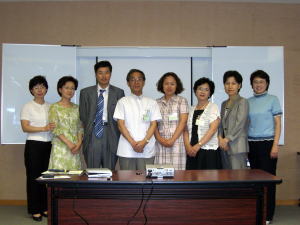
With Dr. Sasaki, Director, Health Management and Promotion Center, Hiroshima A-bomb Casualty Council
Period:
July 3 through July 7, 2006
Training Organizations (in order of occurrence):
Hiroshima A-bomb Casualty Council
Radiation Effects Research Foundation
Hiroshima University Research Institute for Radiation Biology and Medicine
Hiroshima Red Cross Hospital and Atomic-bomb Survivors Hospital
Visit Hiroshima Peace Memorial Museum and other A-bomb related sites
Dr. Cho Ihn-Ho, Professor, Nuclear Medicine Dept., Yeungnam University
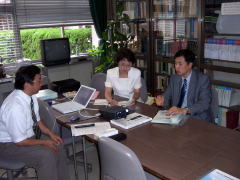
Training Scene: Dr. Cho (the right), with Dr. Matsuura, Professor, Hiroshima University Research Institute for Radiation Biology and Medicine
Impressions:
In spite of such short training period, I was privileged to study a variety of topics. Before I came to Hiroshima, I never imagined how dreadful A-bombing was. It grieved me to know that the number of student victims in particular was larger than I had initially thought. I couldn’t help but feel anger towards the warring parties, the cause of the destruction and yet escaping from the tragic consequences themselves.
I am impressed by the efforts of HICARE and related organizations providing medical aid and activities for the long-term aftereffects, as well as acute syndromes, casued by radiation and the A-bombing.
Medical activities in Korea:
1. I am working in the field of nuclear medicine, as chief of the Nuclear Medicine Department of Yeungnam University.
2 I make examinations for bone cancer in patients, analyzing the results as well as conducting examination management via PAT/CT.
3 I make examinations for pharamacological stress or myocardial blood flow by SPECT for patients suspected of having cardiac affections, particularly angina cordis.
4 I treat hyperthyroid and thyroid cancer patients with I-131.
Ms. Jang Sang-Suk Supervisor Nurse, Busan Medical Center
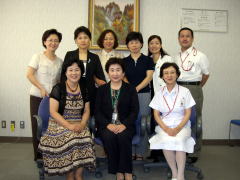
Ms. Jang (the left in the front row), with Ms. Abe, Director, Nursing Dept. Hiroshima Red Cross Hospital and Atomic-bomb Survivors Hospital, and training staff
Impressions:
It was my first time to Japan. When it came to Hiroshima, I knew only that it was where the atomic bomb had been dropped. I furthermore did not have a particularly favorable impressions of Japan, particularly the Japanese Government. However, reality was quite different from my impressions, and I found that when I stayed in Hiroshima I knew very little about Japan.
I felt that I got touch with different aspects of Japan: HICARE's activities, the citizen's who reconstructed a beautiful city from tragic devastation, and overcoming the tragedy itself working to prevent a similar event in the future.
Additionally, I had much to learn from the "Total Nursing Care" system as conducted by Japanese nurses. I was happy to see a different side of things, the news in Japan differing from that in Korea. I was also impressed with all the medical staff, making only the sincerest efforts to introduce to us their knowledge.
Medical Activities in Korea:
I am an administrative nursing supervisor at the Busan Medical Center. I am responsible for the overall nursing administration of the Nursing Dept., education and management for nursing trainees, and patient's service education, as well as a head nurse of the Orthopedics Dept.
I am also a member of the management conference of the hospital.
Ms. Kim Mi-Joo Nursing Service Manager, Seoul Red Cross Hospital
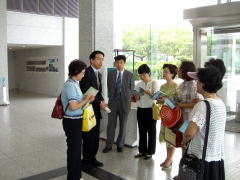
Training Scene: Ms. Kim (the fifth from the left), with Mr. Takano, Vice-Director, Hiroshima Peace Memorial Museum
Impressions:
Having the trained with HICARE and being provided the opportunities I have, the completion of training makes me feel sad. The A-bombing damage in Hiroshima I observed at the Peace Memorial Museum was much crueler than I imagined in Seoul; the destructive power of A-bombing was beyond my imagination.
However, I was deeply moved by and learned much from efforts of Hiroshima, reconstructing the city and aiming for the world peace, as well as with HICARE's activities.
Using experience gained in Hiroshima, I would like to make an effort to support A-bomb survivors more. I think the experience acquired by both observations and lectures by the director of the Nursing Dept., the Hiroshima Red Cross Hospital and A-bomb Survivors Hospital, will contribute greatly to my future nursing activities.
I hoping more of the medical community can receive this training, and I would like to extend my deepest appreciation to the people involved including Dr. Dohy, HICARE President, Dr. Sasaki, Director of the Hiroshima Atomic-bomb Survivors Council, Ms. Abe, Nursing Director of the Hiroshima Red Cross Hospital and A-bomb Survivors Hospital, and the HICARE secretariat.
Medical Activities in Korea:
As a nursing manager, I am in charge of directing and coordinating the work of the Nursing Dept. as follows:
- Personnel management, and work concerning nursing student training (ex. nurses education, management of in-patient wards, and cooperation with other departments)
- Participating in the Hospital Management Committee and other committees
- External activities through the Nursing Dept.
Ms. Koo Il-Nam Nurse, Kyung Hee University Medical Center
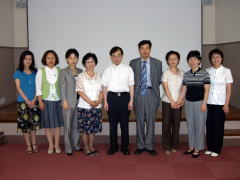
Ms. Koo (the second from the right), with Dr. Neriishi, Assistant Department Chief, Clinical Studies Dept. Radiation Effects Research Foundation
Impressions:
I was honored to participate in this training. Presently, I am interested in HICARE's activities.
During the lecture "A-bomb Survivors" Health Management Allowance" by Dr. Hideo Sasaki, I wished for the earlier receipt of A-bomb survivors allowances. Through the lecture "Effects of A-bomb Radiation on the Human Body" by Dr. Kazuo Neriishi, I began to understand for the first time how to measure radiation exposure from teeth enamel. More than anything else, the visit of the Peace Memorial Museum moved me. I was shocked the instant I saw the diorama showing the city area before and after A-bombing, a lesson that best be remembered.
Lastly, I sincerely appreciate what HICARE has provided for our delegation: the opportunity to exchange information as well as to deepen mutual friendship.
Medical Activities in Korea:
1 Patient management during radiation treatment (ex. education, consultation, safety, and patient's registration)
2 Assisting medical examinations - evaluating the patient (ex. disease name, tissue cells, experiences of operations, anticancer drugs), explaining the condition to the doctor, showing PACS, and assisting the doctor in the examination
3 Management of goods and environment - requests for medical goods and keeping a clinical room clean
4 Participation in education - training in and out of the Nursing Dept., responsibility for training of volunteers participating in the conference hospice team.
Ms. Cho Jeung-Ae Head Nurse, Wallace Memorial Baptist Hospital
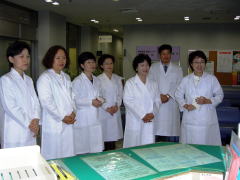
Training Scene: Ms. Cho (the left) at the Hiroshima A-bomb Casualty Council
Impressions:
I felt quite envious of doctors able to combat the real situation regarding the A-bombing, and accordingly participating in the development of further medical treatment.
When I saw A-bomb survivors visiting my hospitals, I thought they were poor people who had received neither compensation nor support by anyone. However, seeing the HICARE-related and staff of the Hiroshima Red Cross Hospital and A-bomb Survivors Hospital work, I began to see clearly my misunderstandings.
I wish both peace and health upon both the survivors and second generations of the A-bomb, expecially given that there may be worry regarding genetic disease (caused by radiation) that may be transmitted to the later generations.
Medical Activities in Korea:
I manage three sections for seriously ill patients (surgery, internal medicine and cardiology), as well as conduct administrative affairs.
I work as a member of three sections in emergencies, and assist work at each section by managing nursing and cardio-pulmonary resuscitations.
I check personnel evaluations, and am in charge of education.
Ms. Park Deuk-Sook Head Nurse, Korea Red Cross Hospital in Daegu
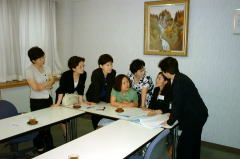
Tranining Scene: Ms. Park (the fourth from the left) at the Hiroshima Red Cross Hospital and Atomic-bomb Survivors Hospital
Impressions:
Although I participated in the training with little knowledge on HICARE's activities, I learned a lot in Hiroshima. I found that HICARE has the ability to effectively use the information gathered by supporting institutes/hospitals for the medical treatment of radiation victims. Moreover, after the visit of the Radiation Effects Research Foundation and the Hiroshima Atomic-bomb Casualty Council, I found that each institute/hospital is promoting medical studies for such patients all over the world.
I hope that the results produced by these studies contribute to A-bomb survivors' health. I feel that I could in some small way help.
Lastly, I would like to thank all people concerned for their continuous research and effort.
Medical Activities in Korea:
I work as head nurse of the Health Examination Center. Being a small scale hospital, we conduct, in addition to general examinations, various kinds of procedures including health checkups of adult disease and cancer as well as for students and new employees.
As in Japan, checkup of adult diseases, conducted once every two years for a person over 40 years old, simply consist of blood analysis, cardiac electrogram, and chest X-ray examination. The number of adult diseases seems to be increasing more than ever; in quite a lot of people disease is caught by the secondary examinations.
In addition to checkup of adult disease, we also conduct examinations of 5 kinds of cancer including breast cancer, colon cancer, uterus cancer, and lever cancer once every two years for those over 40. Sometimes, serious disease is detected, enhancing early treatment. I feel a sense of satisfaction when we get good results.
A new employee's examination is a general checkup including his/her body weight and height. Students in the first and fourth grade in primary school and the first grade in both junior and senior high school are examined. An additional examination is conducted for an obese child.
I am in charge of general checkup affairs for these examinations: blood, bone density, ultrasonography, breast, uterus and stomach endoscope tests, as well as result consultations/mailings. General examinations are conducted both inside and outside the hospital.
Finally, in and above my duties as a nurse, I also work towards the promotion of preventative medicine.




